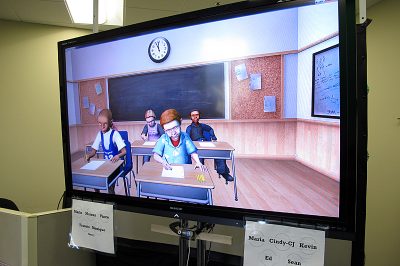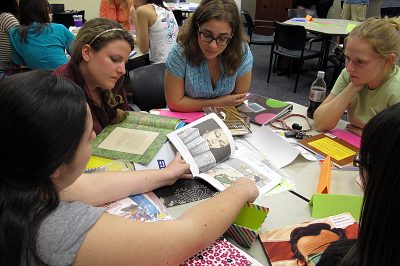Aspiring teachers learn from their avatars

Lisa Dieker went around the room asking her middle-school students what they did over the weekend. CJ went to see the movie “Here Comes the Boom” with her boyfriend. Ed played in a basketball game and Kevin posted new dance videos to YouTube. “Did you work on any art projects?” Dieker asked Maria, a girl bent over a textbook in the back row. “Yeah,” Maria answered. “And what were you working on?” Dieker said. “Just some sketches that I’ve been doing.” It sounded like a typical way to kick off a Monday morning class. There was just one catch: Dieker’s five students weren’t real; they were avatars projected on a screen. She talked to them through a headset and they responded. As Dieker, a professor at the University of Central Florida’s (UCF) College of Education, moved around, her view of the virtual classroom changed. Started ten years ago, the so-called TeachLivE lab was developed by faculty in the education school at UCF, and at least 22 other universities across the country have opened their own labs using TeachLivE technology. Much like a flight simulator trains pilots, faculty use the virtual classroom to train teachers-to-be by helping them isolate and master strategies like higher-level questioning or behavior management. “We can take those parts of teaching just like you could in a flight simulator, and you could work on just the landing or the takeoff or just maintaining your altitude,” Dieker
Teacher training programs grapple with recruitment

Somewhere midway through his sophomore year of college at Florida Atlantic University, Christopher Clevenger started to question his aeronautical engineering major. He liked the coursework, and was doing well at it, but when he thought about his job prospects, the future seemed bleak. “It would be me, a computer screen and a phone,” he said. “I didn’t get that human interaction that I craved.” So Clevenger changed track. He was accepted in Nova Southeastern University’s undergraduate teacher training program. On a campus tour, talking with professors and seeing the level of interest they seemed to have in the teacher candidates, Clevenger was sold. He graduated from Nova in November with a degree in secondary social science and is now teaching world history at a high school near Nova’s Fort Lauderdale campus. Although he switched from a tough major to one that has a reputation of being easy, he stressed that – despite what some people assume―the decision was not because he wanted to earn easy As. “A lot of students see going into the education world as a fallback…That’s where you get the bad teachers,” he said. “It’s definitely not easy. It’s not something you wake up and do if
Florida plans increased scrutiny for education schools

ORLANDO―Lee-Anne Spalding’s Elementary School Social Studies class at the University of Central Florida (UCF) had spread out over the room in small groups. One group of sophomore college students huddled over a set of poetry books, picking out ones they liked. Others gathered around the white board as Spalding demonstrated how to they could embed sounds in their presentations. Spalding had cut into strips a timeline of the civil rights movement and a third group, sitting on the floor, was putting the events back into chronological order. In part, Spalding was providing content to her students by introducing them to materials they might use – like National Geographic magazines and the poetry books. But she was also modeling teaching strategies, like small group learning, and introducing activities, like the timeline exercise, that she hoped her students would
